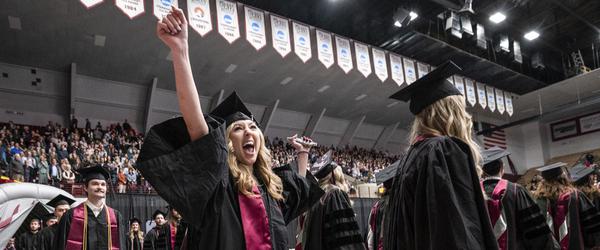MISSOULA – This is a story about a Grizzly from Lewistown, a town nearly smack dab in the middle of Montana, who carved her own path.
Her winding road includes history and math degrees, a stint interning at the nation’s capital, time in a lab spent designing statistical models and a deep commitment to the ethical development of modern technology.
Meet Kayla Irish, a recent University of Montana alumna, who combined the critical thinking of the liberal arts with training in STEM fields, following a thread of curiosity the entire way.
“Sometimes I can’t believe how individualized my path was at UM,” Irish said. “And then I think about how much support I received to pursue practically any topic that interests me. The opportunities offered to me were limitless.”
This fall, Irish will begin a doctoral program in statistics at the University of Washington and focus on the ethical quandaries surrounding artificial intelligence.
“Our world now is all about data, every single choice we make and action we take is a data point,” Irish said. “But what’s more interesting to me is what we do with that data. And a lot of those answers come from history because it can inform us about groups of people having power over the behavior of other groups of people. What we are capable of when it comes to data is worth being concerned about.”
Irish said she always felt a pull toward UM and found herself as a Presidential Scholar in the Davidson Honors College “completely enthralled” with an Introduction to American History class, taught by UM Associate Professor Kyle Volk, chair of UM’s Department of History.
“I noticed right away Kayla’s penchant for rigor,” Volk said. “She sat front and center every day and was a force. She was always prepared and was very comfortable taking different positions with complicated historical problems. She thought deeply and always grounded her insights in evidence.”
Irish said from there she took as many history classes as she could and was invited to take Volk’s graduate level history class. He wrote a letter of recommendation for her to intern in Washington, D.C., which landed Irish an internship with U.S. Sen. Chuck Schumer and a bird’s eye view of the workings of the U.S. Senate Committee on Finance.
Irish said her time in Washington, D.C., sparked an interest to understand “modern societal issues through data and math.”

So she returned from her internship with a hunger for STEM and enrolled in math and computer science classes, taking a deep dive into the disciplines after completing requirements for a history degree.
She sought mentorship and found herself statistics and computer science faculty members like Jon Graham and Travis Wheeler. She also found opportunities to engage with big data. All along, Irish developed a passion for statistical theory and analysis as they relate to human populations.
“The critical thinking side of my brain drives me to pursue human-centered research in AI [Artificial Intelligence], and the logic side of my brain really enjoys dissecting and exploring systems.”
Those systems include self-driving cars, cancer detection technology, advertisements and even phone facial recognition and the ways data is provided to machines.
“Artificial intelligence is only as good as the data it’s given,” she said. “Any bias in the data can hurt the integrity of its decisions.”
That might look like companies using technology to scan for job placements that inadvertently leave female candidates out of the running. Or when a facial recognition system doesn’t identify people of color because the system doesn’t have enough diversity in its data.
“Ideally, I would like to see AI be able to explain or articulate the choices it makes,” she said. “I want to provide AI with an ethical framework.”
Irish said her training in the humanities taught her to approach complex power dynamics with strong writing, research and communication skills, which created a bridge to STEM.
“I cannot overstate how important training in the social sciences is for the modern world,” Irish said. “Data, machine learning, and AI are critical parts of everyday life, so the people working on these technologies need to feel responsible for their impacts.”
Volk said Irish organically found the “connective tissue” between math and history and mastered multiple disciplines.
“Artificial intelligence and data capitalism are rapidly transforming our lives and presenting all sorts of ethical dilemmas,” Volk said. “We should all want someone with Kayla’s humanistic training doing this type of work in the STEM fields. The stakes couldn’t be much bigger.”
###
Contact: Kyle Volk, associate professor, chair, UM Department of History, 406-243-2979,
kyle.volk@umontana.edu.




